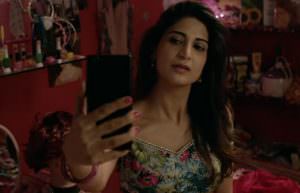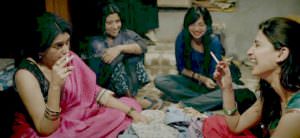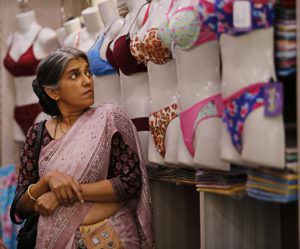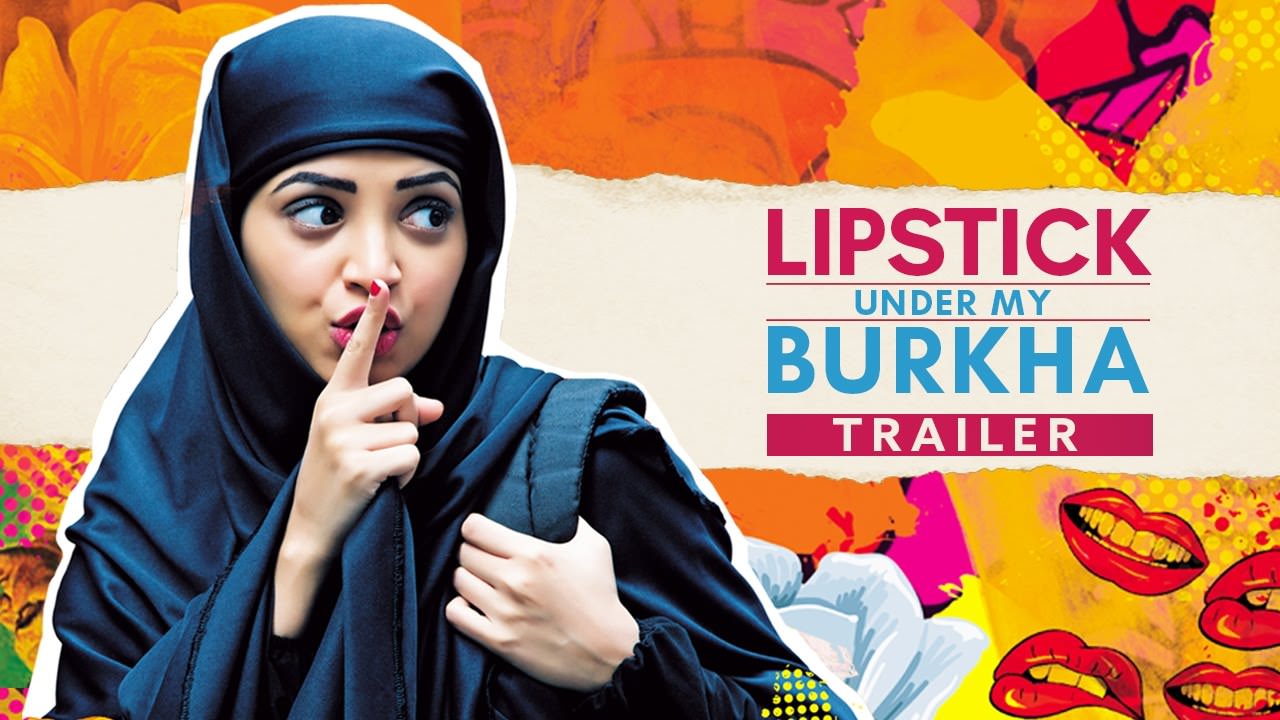“The biggest disappointments of Lipstick Under My Burkha are its sex scenes. Devoid of any heat, photographed in the most unimaginative manner, and ‘calculated’ to a fault, the sex scenes in Lipstick Under My Burkha have the power to wean both women and men off sex. (Because it can have this same effect on both genders, the film does make a unique case for Gender Equality after all!)“
This is how film critic Sreehari Nair opens his infuriating review of Lipstick Under My Burkha on Rediff.com. He fails to understand the power and significance of sex scenes that are meant to make the viewer uncomfortable. He also sees nothing wrong with unabashedly proclaiming what ‘women behaving in their most private moments’ should look like despite being a man!
His review is of greater significance though. It goes on to show that the controversy that ensued in light of Pahlaj Nihalani’s refusal to grant this ‘lady-oriented film’ a censor board certificate is not just about the authorities censoring honest stories of women’s lives. It is equally about people’s patriarchal qualms being expressed openly and brashly when such a film is put to the public test.
https://www.youtube.com/watch?v=fxwXMpZ7AF8
Helmed by writer-director Alankrita Shrivastava, the release of this film is an important achievement. However, the way in which the film has been marketed post the controversy, with Ekta Kapoor stepping in as distributor, is equally dangerous. We should be wary of this idea of a ‘#lipstickrebellion’ that could possibly entail cultural appropriation and misrepresentation.
We need to ask more questions about how this story of Muslim and Hindu women in small town India has been put together. We need to ensure that the film does not entail urban, privileged women hijacking and repackaging other women’s stories and delighting in the universality of a feminism that may not be intersectional at all. This is of special significance given that the film has had a limited release in 400 screens, primarily in multiplexes in big cities.
What follows is my review and experience of watching the film. It is important to foreground my identity as an urban, upper class, upper caste Hindu woman before you read this review. I loved watching these stories unfold on screen because the content of the film is definitely breakthrough by male-dominated Hindi film standards. Nonetheless, I feel that this dreamy eyed review should not obfuscate the need for important conversations around the politics of representation of the film.

Leela takes a selfie to send to her boyfriend
We hear Ratna Pathak Shah’s lovely voice as she enchantingly and achingly tells the tale of Rosie. Reading the story of Rosie and others from ‘ashleel’ (obscene) pulp fiction novels is Shah’s character’s favourite pass-time. The resident owner of ‘Hawai Mahal’, she is the neighbourhood’s respected ‘Buaji’. Cleverly dealing with greedy builders, she refuses to let her 100-year-old dilapidated building be razed to the ground. Rehana (Plabita Borthakur), Leela (Aahana Kumra) and Shirin (Konkana Sen Sharma) are all tenants in Buaji’s house of dreams.
The landlady and her tenants share a friendly relationship with intimate moments of swapping secrets. Yet each seems to walk alone in her journey of desires – those that others force onto her and those of her own, bubbling in parallel worlds without. All four storylines are relatable but the magic lies in Alankrita’s treatment of the film. All plot points may not be unique, but they are told in a refreshingly matter-of-fact way. An ample seasoning of humour and the drudgery of lived experiences combine to really make the film strike a chord.
All four storylines are relatable but the magic lies in Alankrita’s treatment of the film.
Rehana Abeedi is a young Miley Cyrus fan who has just started going to college. Trying hard to fit in, she participates in protests for the right to wear jeans and shoplifts clothes to blend in at parties. Rehana’s college life is a bit too unrealistic. The director falls into the trap of Hindi films’ stereotypical and loud portrayals of ‘coolness’, peer pressure and student life. However, the duality of Rehana’s life is what makes her storyline relatable.
I may not be hiding a short dress under my burkha or a Miley Cyrus poster on the flipside of an inspirational quote, yet there is a marked difference in the way I live my life in front of my parents and in the life that I lead without their knowledge. They know nothing of my sexual desires and I faithfully perform the role of the desexualized daughter, feeling more comfortable with leading a non-confrontational double life till marriage magically changes my ability to speak about sex (at least for health-related purposes).

The four protagonists sit together and bond towards the end of the film
If Rehana’s dual life is relatable, then so is Leela’s appetite for fun sex. She enjoys fooling around with her photographer boyfriend while being forced to get engaged. Her fiancée is an unknown stable middle class boy who is also buying a house for Leela’s widowed mother. She seeks greater companionship from her boyfriend. But he is immature and self-centred, nothing like the benevolent, selfless lover who she hoped would try to stop her wedding.
While her fiancée seems to be naïve and caring, it doesn’t take him long to go through her phone without her permission and find out about her cheating. At the cusp of her mid-20s when we’re supposed to magically figure things out, Leela is clearly confused. Haven’t we all felt that passionate love might solve all our problems, making life a less dreadful journey? What happens when that love becomes oppressive and frustrating, leaving us more alone and less ‘respectable’ in society’s eyes?
And then there’s Shirin. A young mother of three, her Saudi-returned husband exerts his power to oppress her within and outside the bedroom. He refuses to use a condom and she is forced to face the consequences. She deals with the menace of uterus infections, multiple pregnancies and abortions alone. Secretly working as a successful salesperson, she gets offered the job of a sales trainee. But when her husband finds out about the job, he rapes her, ordering her to stick to being a wife.
He refuses to use a condom and she is forced to face the consequences.
Shirin’s body is not a vessel to fulfill her desires. It is at the mercy of her husband for use and misuse, while she cleans up after him. More heartbreaking is the way in which a female colleague and her gynaecologist humiliate her for having undergone multiple pregnancies. They presume that as a woman she has an active say in child bearing. She pretends to be in control, as several of us do. In a society that pedestalizes familial love and happiness, marital abuse is an insult to a woman’s pride, meant to be masked.

Usha looks around a store as she searches for the right swimming costume
Perhaps the most path breaking is Buaji’s story. The audience at Regal was in splits as the swimming coach turns and winks at Buaji. The camera lecherously scans his muscular body as she falls in lust. We laugh at her enjoying her swimming lessons and phoning her crush like a teenager, but are ourselves awakened into seriousness as she orgasms while having phone sex. Usha Parmar is not just Buaji. She is a person with a multi-faceted personality. Is there any space for her to even dream of a sexual fantasy in our ageist and patriarchal society? Why is the 55 year old man she runs into at the start of the film the ‘poor widower’ looking for a new wife? Why must she be the desexualized old woman who acts as the symbol of respectability and free labour for looking after the young?
Is there any space for her to even dream of a sexual fantasy in our ageist and patriarchal society?
The climax of the film revolves around her story, as she is meted out the maximum punishment for the petty theft of a few moments of sexual pleasure. She is thrown out of her house unceremoniously, stripped of every iota of her dignity for desiring a younger man. The other three women are stuck in similar situations, for this film is not utopian. It doesn’t give solutions and it doesn’t revolve around flawless super heroines. This film tells tales of women and their everyday desires, as they fail to snatch from society, even the most basic freedoms.
It is not just the story of these four characters. It is the story of my friends and my desires as Indian women. When we live freely, we often live dual lives with the fear of getting caught. We escape most of the times, but if perchance, we’re found out, we are at the mercy of controlling families and societies. But even in times of tyranny, we will have our stories. This film is our film. Seeing Lipstick Waale Sapne, we dare to dream free.
About the author(s)
Shrishti is a student of Media and Cultural Studies. Long rants with female friends help her channelize rage on the world around. Good food, pretentious poetry and cute canines provide her endless pleasure.





“When we live freely, we often live dual lives with the fear of getting caught. We escape most of the times, ”
Honestly I didn’t get this film until now, I never understood why shoplifting was seen as empowering.
If you’re not interested in a guy, just say so.I don’t understand why leela manipulating a guy and cheating behind his back was seen as an action against “oppression”, or women’s empowerment.
Similarly not taking into account the fact that a young man might not be interested in a elderly woman.
Or walking out of a unhealthy relationship is the responsibility of an individual.
But hey that’s just me being naïve, until you said these lines, I didn’t understood how indian women think, clearly our thoughts aren’t compatible.
My parents did ask me to go for an arranged marriage, as women from my own culture would be more compatible with me.I’m working in the US, but honestly it surprises me that I find more compatibility with the women here